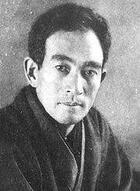
Naoya Shiga (Miyagi, 1883-Tokio, 1971) was born in Miyagi into a wealthy family. He was raised by his grandparents, who were influential during his childhood. They took him away from his mother, who passed away when he was 12 years old. He studied high school at Gakushūin, one of the most elite institutes in Japan, and entered the University of Tokyo in the specialty of Japanese literature and then switched to English literature. There he began his literary career with his companions Saneatsu Mushanokōji and Ton Satomi, among others, with whom he founded Shirakaba magazine. Moreover, he comes into contact with Christianity through the teachings of Kanzō Uchimura for seven years. In 1912, after numerous conflicts with his father, he moved to Onomichi, in Hiroshima. His marriage to Sadako Kadenokōji in 1914 worsens his relationship with his father. In 1917 he presented "At Cape Kinosaki", based on his experiences while recovering from a train accident. Soon after, he reconciles with his father, prompting him to write "Reconciliation." In 1937 he finished his long novel "A Dark Night Passing By", which was published in installments in Kaizō magazine. His writing spanned a total of sixteen years, starting in 1921, including various breaks. In his native country he is known as "the god of storytelling", as a result of his story "The god of the apprentice", and also as "the expert in realism" for the crisp, clean and poetic style. of the. The twenty-three moves that he made throughout his life gave him experiences that he poured into various stories, such as "Seibē and the Pumpkins" and "The Bonfire." Become a literary eminence, in 1949 he was awarded the Order of Culture. In 1955 the second compilation of his works, in seventeen volumes, was published in the Iwanami shoten publishing house (currently it consists of twenty-two volumes). The following year he wrote "The White Line", which he dedicated to the memory of his mother. Writers he came into contact with include Natsume Sōseki, Ryūnosuke Akutagawa, Osamu Dazai, Jyunichirō Tanizaki, and Takiji Kobayashi. He passed away at the age of 88.






